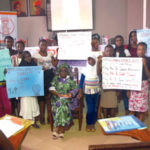TAde Adegbindin’s play, Rage, dwells on one of the biggest challenges facing, not only the Nigerian nation but the entire African continent, as well as some other parts of the world.
Unfortunately, not many know that the consequence of an abused child on the society is enormous.
The play opens with a narration on the struggles Ayoka is going through in child birth. However, as Ayoka ‘is journeying through a strange world, of rhythmic, unrelenting agony,’ the man responsible for her pregnancy, Akuba, is being sentenced to jail in court.
The fact that Ayoka goes through the process of child birth in Layeni, her friend’s house, in a squalid environment in Ibadan, reveals to the reader the baby is unwanted, and after child birth, Ayoka’s mother, Mrs Fala, shows up to take her daughter home, with a promise to Layeni that she is taking the child for proper medical care.
However, Mrs Fala’s conversation with Ayoka and Layeni during her visit shows she is not too keen on the child she keeps referring to as ‘Little Devil.’
The reader is then transported to a refuse dump where a drunkard, Gbada, finds a little baby boy, on his way home on a particular night.
Gbada takes the baby home and names him Esan (Payback, Nemesis), although, as later known, he becomes the source of constant quarrels between him and his wife, Sabi.
While Gbada loves Esan, Sabi hates him and prevents him from attending school. She only allows him to hawk on her behalf, while her biological daughter, Ramota, who is far older, does nothing in the house.
Meanwhile, Ayoka, in a bid to start life afresh after that child birth, relocates to Benin. Akuba, who has also finished his prison term, is also in Benin and runs into Ayoka one day as she waits to board a cab.
The meeting between Ayoka and Akuba causes a street commotion, as Akuba begins to harass her, asking for his child.
It is the senator representing the district, Senator Madu, who rescues Ayoka from Akuba’s beatings, while Akuba is arrested for assaulting a woman. Later, Senator Madu, a chronic womaniser, marries Ayoka.
Meanwhile, Esan, after growing tired of Sabi’s constant abuse, escapes to Lagos after stealing her money.
In Lagos, Esan forms a three-man gang that robs and kills only women. It is later known that Esan kills his victims because of his childhood pains, and to revenge the woman who puts him on a refuse dump to die.
In Benin, Senator Madu continues his philandering way of life, sleeping with Ayoka’s maid, her friend, and even her mother. In the end, Ayoka poisons Senator Madu and her mother, before relocating to Lagos.
In Lagos, she is being ferried around by Asper, a taxi driver who belongs to Esan’s gang, and who spies for the group.
Asper gets the necessary information about Ayoka, and by this time, the police have started looking for Esan, who kills his victims after robbing them by slashing their throats with a knife.
During one of his operations, Esan discovers his adopted father, Gbada, now works in a hotel as a guard. Upon this realisation, he gives Gbada N30,000 he got from the operation, and it is through this that the police are able to unearth Esan’s background and his troubled past.
After obtaining the necessary information on Ayoka from Asper, Esan goes after her in the hotel room where she is lodged.
Upon sighting Ayoka, Esan feels a connection, but tells her he is the terror he is because a woman dumps him on a rubbish heap to die 20 years ago.
Ayoka instantly realises the ‘Little Devil’ before her is her son whom she dumped, but before she can say anything, she is shot by Esan.
The policemen who have been working on Esan over the years finally trailed the gang, arresting Esan and Asper, but killing the third member, Capone.
The play, published by Extension Publications Limited, Nigeria, pinpoints that the issue of child abuse, which was not properly addressed in the past, is part of the problems the continent is facing today, especially in the area of insecurity, and if it is also not addressed today, then we will continue to deal with it in the future.
One delightful thing about the play is the author’s use of flowery language and humour to keep the reader glued to the book.
For example, when Esan tells his adopted father, Gbada, that Sabi (his adopted mother) and his friends have been calling him a bastard, Gbada tells him not to be discouraged and that ‘you shall survive the lashes of the human tongue.’
Again, when Senator Madu orders his aides to put Akuba in the booth of his vehicle, he tells Ayoka: ‘The dog cannot bite you now, the booth of the car will cure him of his rabies.’
The main message of the play comes to the fore when Esan and Kamali, about to flee to Lagos, discuss the issue of child abuse.
Esan describes child abuse as a disease, ‘and the pain it gives is great.’
Kamali corroborates Esan’s view, saying child abuse is more dangerous than AIDS. ‘Child abuse destroys, too, but by removing the humanity in you.’ This then explains why Esan becomes the vicious person he finally turns out to be.
Even, during the discussion among Esan’s gang members, Asper explains that child abuse is the cause of their evil ways. He admits: ‘It breeds our likes, only our likes — criminals and merciless dregs.’
The author holds a doctorate degree from the University of Ibadan, where he currently lectures.






